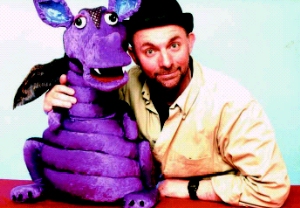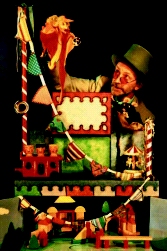Puppetry has been part of British culture for over 350 years. It has been used as a children?s entertainment, a satirical and political tool, and an adjunct to films and TV. It has become part of the fabric of entertainment as much as dance, drama, mime or any other branch of our cultural life. Yet according to John Field, it has always been the Cinderella service, grossly under-funded and neglected by those who support and fund the Arts.

Puppetry in the UK exists on several levels. There are individual puppeteers who earn their living solely on stage, TV and film. Recognised around the world for their talent, skill and accuracy, this group is slowly diminishing in size as the quest for ever-cheaper film and television moves production from UK studio bases to more remote areas. By far the largest and most proactive area of puppetry in the UK, however, is the touring company or performer. These small, professional and talented companies with two or three members in each, tour schools, arts centres, theatres and parks ? in fact anywhere a show can be staged - entertaining thousands. Several companies perform to well over 100,000 people each year. Dedicated puppeteers staff these companies and they do everything. They are their own lighting, sound, administration, promotion and office ? and this is before any performing.
Promoting puppetry
I started No Strings Attached in 1997 when it was clear that there was a need for a professional agent who could represent this volume of talent and offer an administrative and promotional base for companies. The agency is now the largest in the UK for puppetry and children?s theatre and represents over 50 companies and individuals. On any one weekend during the year we will be promoting twenty or so performances, mainly for children and their families, netting in excess of £18,000 at the box office. Yet this is only a small part of what happens each week and only a small part of what these companies do. Many of them are actively involved in schools, often playing at discounted rates.
Over 175 organisations in the UK regularly present these shows, as well as others that take the occasional show. These venues recognise the enormous value of having a full house on a Saturday morning. Patrons will not only buy tea, coffee and ice-cream but can see what is on offer in the theatre in the coming weeks. There is an enormous, and quantifiable, knock-on effect.
A bleak outlook
Although there is a growing body of work aimed at adult audiences (a spin off from developments in Europe and the support of several Puppet Festivals such as Visions in Brighton, Bath?s Snap The String and Blackpool?s Puppet-Up) the main thrust of the work of these companies tends to be family and child-oriented shows aimed at an audience size of between 80 and 350. The shows are professionally written, designed and directed, and are as mainstream as one could devise. They fulfil so many of the criteria that our funding bodies exhort venues to meet. These companies attract new audiences. They are cost effective (and have hours of unpaid work poured into them as well as a great deal of self-financing).They attract family audiences. They act as an educational tool to introduce children to the idea of live entertainment. They offer an enormous social and socio-political dimension to a theatre.
Yet these puppet companies exist within a professional structure that has been assiduously ignored by funders for too long. For 25 years in Battersea there existed a National Puppet Centre. This offered a place for puppeteers to swap ideas, develop new work and gain valuable support and training. The centre also offered a useful first-call for film and TV companies looking for assistance. It published a wonderful magazine called Animations, and was also the National Puppet Archive - a resource for students and academics studying puppetry. It existed on a knife-edge for many years with funding bodies arguing over responsibilities. Ultimately the Centre slipped through the net and cut back its services drastically. The excellent full-time staff went and now the centre exists on a two/three afternoon a week part-time volunteer basis. This is hardly encouraging for new puppeteers and indicates clearly what the powers-that-be think of puppetry. Yet its leading light for many years, Penny Francis, was recognised with an MBE for her work with the Centre.
Building problems
Wales has the Harlequin Theatre, and England has two building-based puppet theatres. One of these, Norwich Puppet Theatre, exists in a medieval church and produces work of international recognition. It tours widely both nationally and internationally. The other is the Little Angel Theatre in Islington, North London. This theatre, which is as near as we have got to a National Puppet Theatre, has been producing stunning family theatre for nearly 50 years. Many of today?s puppet companies owe their existence to the Little Angel for the training opportunities it has offered over the years. Without this theatre puppetry in the UK would be more amateur, a lot less lively and nowhere near as widespread. John Wright, the founder of the theatre, like Penny Francis, was recognised with an MBE for his promotion of puppetry in the UK.

Yet the Arts Council repeatedly refused to fund the theatre per se ? offering grants towards new work but not to the structure that is needed to promote, produce and support the work. At the end of April this remarkable national resource went dark. The money simply was not there to produce shows in the building. The company is still touring (and has in the past represented the UK at many Festivals), but the future looks bleak for the Little Angel. Its loss would be a shameful and damning indictment of the abysmal way that puppetry has been treated by funders over the years.
Funding failures
Something has to change. Puppeteers recognised this recently when the craft organisations representing the various arms of puppetry came together to form Puppeteers UK. This will hopefully be a powerful voice that will make the funding bodies sit up and recognise the value of puppetry. However at a recent meeting a large bottle of Obsequious Oil was poured by the Arts Council of England. Frankly I doubted its veracity.
Arts Councils and Arts Boards must recognise that puppet companies ? both building-based and touring are an important part of the arts scene. They must make funding available for both sides of the craft in order for it to continue to produce new and exciting work. They must recognise that small puppet companies often fail to reach funding requirements by dint of their management structures. It is oxymoronic to suggest that a company must have a structure that is in line with a funder?s requirements when the funders would not fund a base to enable them to meet those requirements ? Catch 22, 23 and 24 I think.
Action is needed ? in the case of the Little Angel, immediate action ? and the time for shabby talk, shifting blame and responsibility is over. Funders must react positively and proactively towards puppetry or we will see this magical craft slowly erode and disappear. The grants needed to keep the Puppet Centre and the Little Angel open would be around £140,000 a year. I believe it costs twice that to keep the Millennium Dome closed for one month. What odd priorities we have! I wonder if the Minister responsible for the Dome would like to join the Board of the Puppet Centre?

John Field has been a teacher, actor, director author and playwright. He was administrator of Upstream Children Theatre for six years in the 90s and founded No Strings Attached Ltd in 1997. t: 020 7690 7449 e: nostring@blueyonder.co.uk



